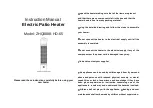
Pre-Operation Leak Testing
GENERAL INFORMATION
Although all gas connections on the heater are leak tested prior to shipment, a complete gas
tightness check must be performed at the installation site due to possible shifting during shipment,
installation or excessive pressure unknowingly being applied to the unit. Periodically check the whole
system for leaks and immediately check the system if the smell of gas is detected.
BEFORE TESTING
1. Do not smoke while leak testing.
2. Extinguish all open flames.
3. Never leak test with an open flame.
4. Mix a solution of equal parts mild detergent or liquid soap and water.
TESTING
1. Turn off the burner control knob.
2. Turn the top knob of the fuel supply cylinder counter-clockwise (right to left) two (2) rotations to
open.
3. Apply the soap solution to connections of the fuel supply assembly. If no soap bubbles appear,
there is no gas leak. If bubbles form at the connections, a leak is detected. If a leak is detected,
immediately turn off the gas supply, tighten any leaking fittings, turn gas on, and repeat steps 1-3.
4. Turn off the knob on the fuel supply cylinder.
5. Turn on the burner control knob for a moment to release the pressure in the hose, then turn the
control knobs back off.
6. Wash off soapy solution with cold water and towel dry.
Check all gas supply fittings before each use and each time the gas supply cylinder is connected
to the regulator. Have a qualified service technician leak test the heater any time a part of the gas
system is replaced.
Also it is recommended to perform a leak test at least once a year whether or not the L.P. gas supply
cylinder has been disconnected.
When leak testing this appliance, make sure to test and tighten all loose connections. A slight
leak in the system can result in a low flame, or hazardous condition. Most L.P. gas tanks now
come equipped with a leak detector mechanism internal to the tank, when gas is allowed
to escape rapidly, it shuts off the gas supply. A leak may significantly reduce the gas flow
making the heater difficult to light or causing low flames.
If you cannot stop a gas leak turn off the gas supply and call your local gas company or
the dealer you purchased the appliance from. If necessary, replace the faulty part with the
manufacturer’s recommended replacement part. A slight leak could cause a fire.
▲
!
WARNING
▲
!
WARNING
17






































